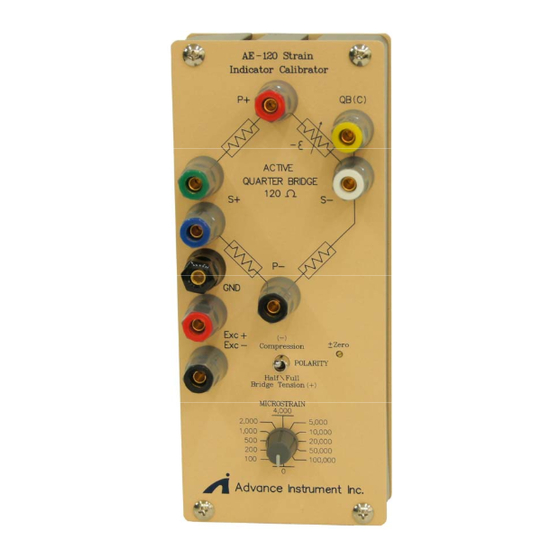Summary of Contents for Advance Instrument AE Series
- Page 1 AE Series Strain Indicator Calibrator Model AE-120 / AE-120E AE-350 / AE-350E User’s Manual Advance Instrument Inc. service@advanceinstrument.com Phone:+886-2-8695 1100 • Fax:+886-2-2693 1460...
-
Page 2: Table Of Contents
INSTRUCTION MANUAL AE Series Strain Indicator Calibrator Model AE-120 / AE-350 SECTION 1: DESCRIPTION ................. 2 GENERAL ......................2 SPECIFICATIONS ....................3 FUNCTIONAL DESCRIPTION ................4 SECTION 2: INDICATOR CALIBRATION ............5 CONNECTIONS ....................5 CALIBRATOR SET-UP ..................6 INDICATOR SET-UP ................... 6 DATA REDUCTION ..................... -
Page 3: Section 1: Description
MODEL AE STRAIN INDICATOR CALIBRATOR SECTION 1: DESCRIPTION GENERAL The AE Strain Indicator Calibrator is a passive instrument designed to simulate strain gage circuits for the purpose of statically calibrating the indicator or conditioner to which they would be connected. True Wheatstone bridges circuits: quarter-, half- and full bridge of both 120Ω... -
Page 4: Specifications
SPECIFICATIONS Model AE-120 / AE-350 AE-120E / AE-350E Accuracy 0.1% of setting ± 1με 0.05% of setting ± 0.5με ( 0.00025mV/V ), max. ( 0.0005 mV/V ), max. Repeatability ± 1με ( 0.0005 mV/V ), max. ± 0.5με ( 0.00025 mV/V ), max. Stability ( 0.1% of setting ±... -
Page 5: Functional Description
FUNCTIONAL DESCRIPTION BINDING Posts The active bridge is between P+ and S-, while a fixed resistor is in between P- and S-. A fixed resistor is also in between each P post and each S+ post respectively, these forms a half bridge if the shorting link at S+ is closed. -
Page 6: Section 2: Indicator Calibration
SECTION 2: INDICATOR CALIBRATION 2-1 While the following instructions explain proper use of this instrument in detail, a brief instructions found on the instrument rear lid will normally be adequate for subsequent use. CONNECTIONS 2-2 Check proper calibrator requirement: AE-120 / AE-120E for 120Ω resistance, while AE-350 / AE-350E for 350Ω. -
Page 7: Calibrator Set-Up
b. Unstable zero due to changes in lead resistance with ambient temperature. c. Span errors when the indicator is "calibrated" by shunt-calibration of arms external to the indicator. All the above effects are proportional to the ratio of the lead resistance to the gage ( or bridge arm ) resistance. -
Page 8: Data Reduction
DATA REDUCTION 2-9 Strain Indicator: a. If set for GF = 2.000 and, no data reduction is necessary: the indicator reading and calibrator can be directly compared. Some non-linearity in the indicator would be expected at the higher readings. b. If set for any gage factor other than 2.000, the following relationship applies: Ideal indicator reading = calibrator setting multiplied by 2.0 / GF where GF = The gage factor of the strain gage connected to the users indicator. - Page 9 Table 1. Bridge Non-Linearity with Error Range One Active Arm One Active Arm One Active Arm MICROSTRAIN Bridge Output Simulate Strain Simulate Strain Simulate Strain Rotary Switch AE-120 / AE-350 AE-120E / AE-350E Standard Non-Linearity position Include Error Range Include Error Range 0.1% Setting ±...
-
Page 10: Ae As Precision Attenuator
AE AS PRECISION ATTENUATOR 2-11The AE Strain Indicator Calibrator is simply a passive network in a real Wheatstone bridge configuration with an output/input ratio from 0 to 0.05 in 100, linear steps. It therefore has application where large but precise attenuations are required. For example it can be used to check the linearity of low-input instruments. -
Page 11: Section 3: Servicing
3.2 Should it be necessary to replace any resistors in the networks, it is strongly suggested that such replacements be obtained from Advance Instrument Inc. to maintain the superior quality of these resistors with special regard to stability with time and temperature.



Need help?
Do you have a question about the AE Series and is the answer not in the manual?
Questions and answers